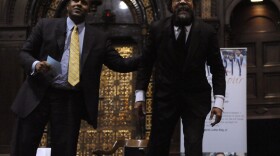
Corey Dade
Corey Dade is a national correspondent for the NPR Digital News team. With more than 15 years of journalism experience, he writes news analysis about federal policy, national politics, social trends, cultural issues and other topics for NPR.org.
Prior to NPR, Dade served as the Atlanta-based southern politics and economics reporter at The Wall Street Journal for five years. During that time he covered many of the nation's biggest news stories, including the BP oil spill, the Tiger Woods scandal and the 2008 presidential election, having traveled with the Obama and McCain campaigns. He also covered the 2007 Virginia Tech shootings and Hurricane Katrina, which led to a nine-month special assignment in New Orleans.
At the Journal, Dade also told the stories at the intersection of politics, culture and commerce, such as the Obama presidency's potential to reframe race in America and the battle between African-American and Dominican hair salons for control of the billion-dollar black consumer market.
Dade began his reporting career at The Miami Herald, writing about curbside newspaper racks and other controversies roiling the retirement town of Hallandale, Fla., pop. 30,000. He later covered local and state politics at the Detroit Free Press, The Boston Globe and The Atlanta Journal-Constitution.
No stranger to radio, over the years Dade has been a frequent guest commentator and analyst on NPR news, talk and information programs and on several cable TV networks.
As a student at Grambling State University in Louisiana, Dade played football for legendary coach Eddie Robinson. He then transferred to his eventual alma mater, the University of Maryland.
-
Florida is arguably the only state where Latino Republican voters matter in presidential primaries, thanks to the fiercely party-loyal bloc of Cuban Americans in South Florida. And the candidate squarely in the crosshairs of Latino and pro-immigrant groups in the Sunshine State is Mitt Romney.
-
Rick Perry garnered instant front-runner status in some polls when he joined the GOP presidential race. But he slid to the back of the pack after embarrassing debate performances. All along, his bid for the nomination seemed outsize. So, too, were the expectations, which ended Thursday.
-
Huntsman's candidacy never resonated with Republican primary voters. In announcing his withdrawal from the race, he says he will support Romney, calling him the "best equipped" to defeat President Obama.
-
Tavis Smiley and Cornel West have made a traveling road show out of their roles criticizing President Obama. As the 2012 campaign begins in earnest, the duo seem to be moderating their tone.
-
New state laws will require millions of voters to show photo identification when they cast ballots this year. Republicans claim the measures will prevent election fraud. Democrats and activists oppose them, arguing that they are unnecessary because voter fraud is rare.
-
With just one week to go before Iowa voters head to the caucuses, polls show a tight race. What do the GOP candidates need to do to gain an edge?
-
If Sen. Marco Rubio received the GOP's vice presidential nomination, only 13 percent of Latinos said they would be "much more likely" to vote Republican. Nearly half said it would have no effect on their vote.
-
As police dismantle more of the remaining Occupy camps, protesters in Washington staged sit-ins at congressional offices. Now they're targeting corporations and lobbying firms on K Street.
-
This year set a record for recall elections, as 11 lawmakers were forced to defend their seats — and four of them lost. Now Wisconsin Gov. Scott Walker faces an effort to oust him from office. Despite the anti-Walker fervor, though, recall elections usually face long odds.
-
Reports of increased hiring and strength in manufacturing along with central banks moving to help ease Europe's financial crisis sent stock markets up sharply Wednesday. Analysts said the economy isn't on the verge of booming, but the risks of a double-dip recession have eased.










